Five Questions: Geographic information systems support and research facility
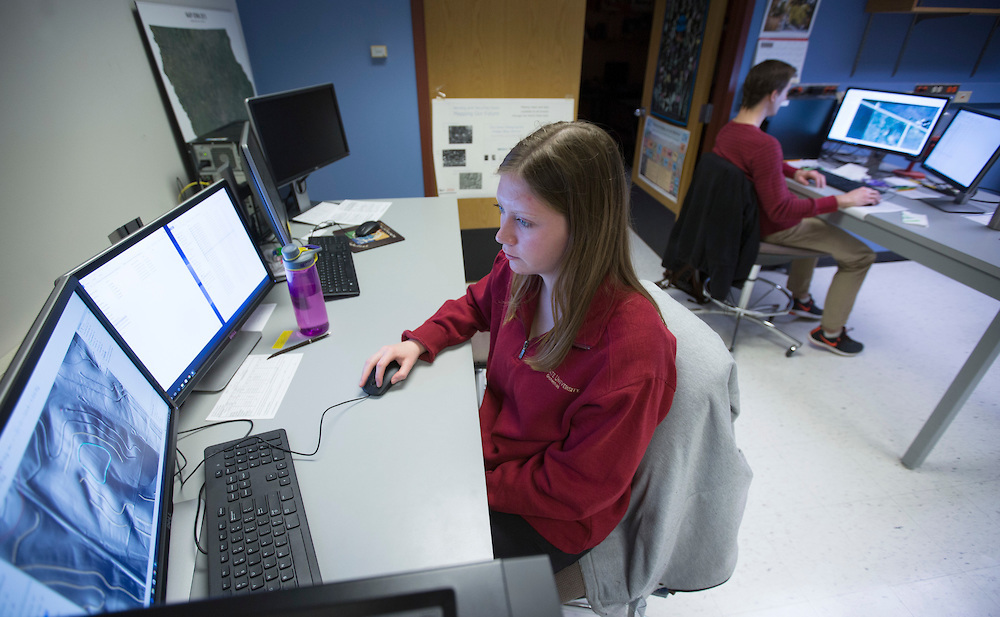
Junior Evann Martin, a community and regional planning major from Cedar Rapids, digitizes farming conservation practices in the GIS facility. Photo by Christopher Gannon.
Attention researchers, administrators, faculty, staff, students or map enthusiasts: The staff at Iowa State's geographic information systems (GIS) support and research facility can visually reveal research results, statistics, numbers and a host of other measurable data using its powerful imaging and mapping GIS software. Robin McNeely, GIS lab manager and analyst, shares insight into the facility and how it's making an impact at the university and throughout Iowa.
The basics
Established: 1991 in the office of the vice provost for research. Today, the GIS facility is administered within the College of Design.
Employees: Two full-time staff, three part-time staff and nine student workers
Location: Research lab is in 218 Durham Center; teaching labs are in 526 College of Design and 248 Durham
Facility hours: 8 a.m. to 5 p.m., Monday through Friday. Walk-ins are accepted, though it's better to make an appointment via email.
What is the function of the GIS facility?
We're here to support the use of geographic information systems for all of campus and beyond by offering access to the GIS software. We also offer help for people who don't know how to use the software or who may want to take tutorials. We can help you get a project started for free, or they can pay us to do project work. If they have data or an idea of what they want to do with their data, but they don't know how to use the software or they don't have time, we can go over the options.
How would faculty or staff use GIS?
GIS is software that does spatial analysis of data. There are people in every college who use it. Anyone who has data that can be placed somewhere on the globe can utilize GIS. Let's say you have data on ISU students who have graduated, and you know what county they came from. The software can take the tabular data of that information and join it by county name to our data set. The software will create a visual map, showing information such as the number of students from each of the counties, the grants they received, or what majors they studied. GIS is good for census data, and there are staff members, especially those in admissions and at the alumni association, who need to look at demographic information.
What makes GIS so powerful?
It's a tool. You just need to know the piece of the tool you want to use and what you want to get out of it. For someone who doesn't know GIS, they think it's like Google or Bing -- you can see a map, you can see town names and roads. That's like high-level GIS. The part that makes GIS more powerful is that there's a whole database behind the scenes. So everything you're looking at, there's a table that contains whatever information you want, and the table and the database are linked. You can query your database and see it visually in a table or you can look at the map and see the data. When you have a table with data, you get a feel for what it says. But as soon as you see it on a map, patterns pop out. To see your data visually opens up a whole new world of things you wouldn't have noticed in a table.
Does the GIS facility offer services beyond the university?
We do contract work for the Iowa Department of Natural Resources, the Iowa Department of Agriculture and Land Stewardship, the Iowa Department of Transportation through our work with Iowa State's Institute of Transportation (InTrans) and many other organizations. We have people and companies come to us from off campus that may not have the staff to complete their own GIS analyses, both private and public. We work with companies throughout the state. Every now and again, I get a phone call from a farmer who needs a map of his property, so we do that type of work for individuals also. If they need significant help, we let them know about our fees for service, printing of maps, shipping of documents, etc. Sometimes lawyers call because they need a certain map from a certain date to prove something. You just never know when the phone rings. It's a job that is almost always something new and interesting.
The GIS facility employees often host "mapping parties" for the campus community. What are they and why do you offer them?
That's the outreach side of us. We like to share and show people that the introduction to GIS isn't that complicated. The mapping parties are related to humanitarian work because there is no GIS data for some countries. The Red Cross, for example, wants to know where there are roads or buildings or open fields so they know where to land a helicopter. We have a day -- very often around Martin Luther King Jr. Day -- when faculty, staff, students and the public are invited to come to the lab and sign up for a free account. We teach people how to use the interface, and they create data. If you can use a mouse and trace something on a photo, you can do it. It's a simple intro to GIS, and people can get a feel for what it's like. And, they might decide they have a need for it in their real lives and look into it.
Regent decisions scheduled for tuition, Student Innovation Center, faculty PDAs
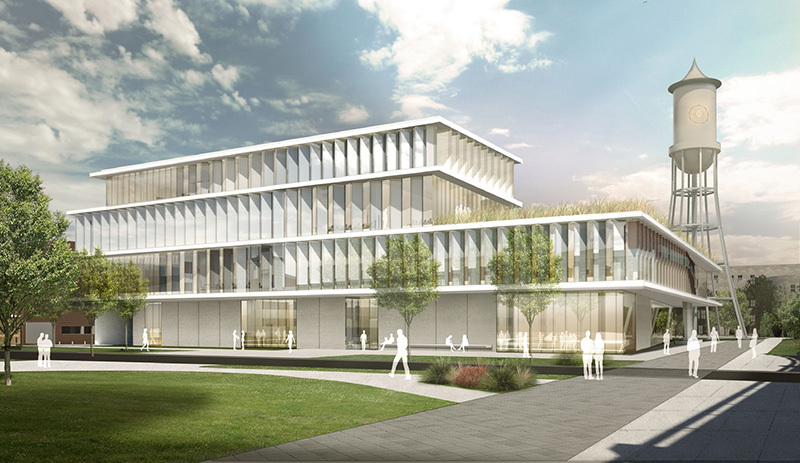
Architect's sketch of the Student Innovation Center, viewed from the southwest. Visible in the foreground is Bissell Road; in the background (left) is Sweeney Hall; (right) is Marston Hall. The state Board of Regents will be asked to give its final approval to the project when it meets on Dec. 5. Submitted image.
A vote on 2017-18 tuition and fee rates, a green light on proposed faculty professional development assignments for next year and final board approval of the Student Innovation Center are anticipated when the state Board of Regents meets Dec. 5-6 at the University of Northern Iowa. More than half of the two-day gathering will be used to interview three finalists for the UNI presidency and select the next president. Not on the agenda is the outcome of an audit of travel policies and state equipment use at the three regent universities, including Iowa State's purchase of airplanes. The board requested the review last month from its audit team on the heels of questions about President Steven Leath's use of university planes.
Audio of public portions of the meeting will be live streamed on the board's website. The agenda and supporting documents also are online.
Student center
The regents will be asked to sign off on a schematic design, project description and budget ($84 million) for the Student Innovation Center, to be built north of Hoover Hall. The southeast end of Sweeney Hall and the Nuclear Engineering Lab will be demolished in the spring to create space.
The 140,000-square-foot building will be cross-functional, collaborative and used by students from all corners of campus. Flexible spaces will be used for a range of activities and events. Specific spaces will be dedicated for fabrication, prototyping, documenting, design, testing and assembly. As proposed, the facility would be clad predominately with a high-performing glass that balances aesthetics with performance and environmental goals. The east, south and west facades would manage solar heat while providing high visibility into and out of the building to showcase student activities. Most of the north façade would be opaque for high insulation.
The project will be paid for with $44 million in private gifts and $40 million in state appropriations (spread over four fiscal years, 2017-20, as approved by the 2015 Legislature). The budget includes $64.4 million in construction costs, $10.7 million in design and project management fees, $6.6 million in equipment and furniture, and a $2.3 million contingency.
The anticipated timeline is to begin construction next summer and wrap up by January 2020.
Faculty professional development
Iowa State leaders will seek approval for 42 faculty development assignments during fiscal year 2018. This is an increase over this year's 31 assignments and the 37 approved in both FY 15 and 16. Fifty faculty members, from an eligible pool of 1,872, submitted proposals. The submitted list includes 13 projects that will last for the academic year and 29 that will last for six months or less.
The three regent universities establish their own policies and rules for eligibility. At ISU, all faculty members employed at least halftime are eligible to apply for a professional development assignment. There is no requirement on length of service. Priority may be given to tenured faculty over adjunct and nontenured faculty, and to individuals who have not had a professional development assignment in the last five years.
Tuition and fees
The board took a first look at proposed 2017-18 tuition rates at its Oct. 20 meeting; a vote is scheduled for Dec. 5. If the proposal is approved, tuition for most resident undergraduates would go up $142 (2 percent) next year. A 3 percent increase is proposed for nonresident undergraduates ($614), graduate students ($254 for residents, $654 for nonresidents) and veterinary medicine students ($646 for residents, $1,430 for nonresidents).
Iowa State's tuition proposal includes differential tuition for juniors, seniors and graduate students in five programs: animal science, biology, computer science, industrial design and natural resource ecology and management. The proposed differentials -- $1,600 in the undergraduate programs and $1,124 in the graduate programs -- reflect higher instruction costs and would be implemented over three years.
Iowa State also proposes to adjust several previously approved tuition differentials for consistency. These changes include:
- Raise the differential tuition rate for bachelor of architecture students to the same level as the five undergraduate programs above. Architecture students have paid differential tuition since the 2012-13 academic year, currently about $1,250. To reach a $1,600 differential in three years, an additional $98 for residents and $106 for nonresidents would be assessed in year one.
- Raise differential tuition for upper division Business students over three years to match that for upper division students in Engineering, ag systems technology and industrial technology (currently a difference of about $560 for resident students). Next year, junior and senior Business students would pay an additional $190 (resident) or $180 (nonresidents).
The 2017-18 year is the second in a three-year plan in which all international students will pay $500 per year incrementally above nonresident tuition increases, for a total of $1,500 when fully implemented.
More Iowa State items
In other Iowa State-related business, the board will be asked to:
- Approve the university's request to name the Black Cultural Center on Welch Avenue the George Jackson Cultural Center in memory of the former assistant vice president of student affairs and assistant dean of the Graduate College. Jackson, an advocate for underrepresented students, retired from Iowa State in 2009 and died in July.
- Approve the university's request to purchase 78 acres on University Boulevard immediately south of the ISU Research Park from Ames' Hunziker family for about $2.5 million. This includes approximately nine acres previously transferred to the university so that infrastructure improvements could begin as part of the park's third phase. The purchase would be funded by prior land sale proceeds and facility overhead use funds.
- Approve an $11.4 million renovation of the bathrooms in six Richardson Court residence halls: Barton, Birch, Freeman, Lyon, Roberts and Welch halls, to be funded by dormitory system funds. The changes would create more privacy; revamp restroom accessibility to meet the Americans with Disabilities Act; update mechanical, electrical and plumbing systems; enhance lighting and upgrade energy efficiency. The work would be completed in two phases, during the summers of 2017 and 2018.
- Approve two renovation projects for the Wallace and Wilson residence halls (The Towers): a $3.3 million replacement of 1,280 windows and a $2.7 million effort to replace the flooring in student rooms and lighting in the corridors and paint the building interiors. The work also would take place during the summers of 2017 and 2018. Dormitory system funds also would cover these costs.
- Approve three leases with the city of Ames for university land the city operates as public parks. They are: 67 acres for Brookside Park on Sixth Street, 26 acres for Stuart Smith Park on University Boulevard (20-year leases for both) and four acres for Franklin Park on South Franklin Avenue in west Ames (4.5-year lease). Iowa State intends to sell the Franklin property in 2021.
Wickert reappointed as SVPP
President Steven Leath has reappointed senior vice president and provost Jonathan Wickert to a second five-year term, effective July 30, 2017.
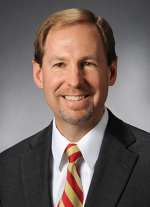
Wickert
Wickert became Iowa State's provost on July 30, 2012, following a national search. At the time, he was completing his third year as dean of the Engineering college (2009-12).
"I am pleased Dr. Wickert has agreed to serve for another five years as senior vice president and provost," Leath said. "He has been instrumental in our pursuit to advance Iowa State's academic programs, attract and retain top faculty, and enhance our scholarly reputation. We've made great progress, and with Dr. Wickert's leadership, we will continue to move Iowa State's academic mission forward."
Highlights of Wickert's first term in the senior VP/provost role include:
- Ensuring the continued quality of undergraduate and graduate programs in a time of record enrollments
- Hiring more than 400 tenured and tenure-eligible faculty under a presidential initiative to build the quality and ranks of ISU’s faculty
- Investing in the creativity and scholarship of faculty, which has produced record levels of sponsored research funding
- Encouraging collaboration across the university community to boost graduation rates and maintain a 95 percent job placement rate
Wickert currently is the lead investigator on a 16-school Midwestern alliance focused on increasing the quality and quantity of students completing STEM programs and the quantity of underrepresented students who pursue graduate degrees. A $5 million grant from the National Science Foundation supports the project.
"It’s a great privilege to serve as Iowa State’s provost, and I am grateful for the opportunity to continue in the role," Wickert said. "We have celebrated numerous accomplishments over the past four-plus years, enabled by outstanding students, faculty and staff, and strongly supported by President Leath and the Board of Regents. I look forward to the next five years and further progress in moving Iowa State forward.”
Wickert is a professor of mechanical engineering and came to Iowa State in 2007 as chair of that department. Previously, he served 17 years on the mechanical engineering faculty at Carnegie Mellon University, Pittsburgh.
WinterFest is in full swing Dec. 2
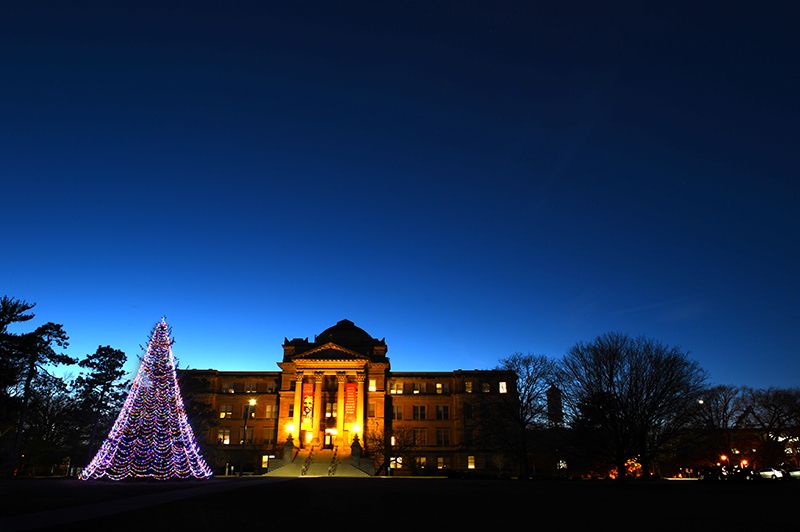
A tree lighting ceremony is part of the annual WinterFest celebration. Photo by Christopher Gannon.
Campus and community members are invited to come together for the annual WinterFest celebration. Most events will be held on Friday, Dec. 2. Activities are free (unless indicated) and open to the public.
A weeklong clothing drive (Nov. 28-Dec. 4) already is underway. Gently used or new clothing donations -- preferably winter hats, socks, gloves and coats -- will benefit Ames-based Youth and Shelter Services. Collection boxes are located in LeBaron and Oak-Elm halls, Memorial Union, Union Drive Community Center and Maple-Willow-Larch commons.
In addition to Friday, these WinterFest activities include more dates: Art Mart sale (3-5 p.m. Thursday, 10 a.m.-1 p.m. Saturday), University Book Store winter sale (7:45 a.m.-6 p.m. both days) and Cyclone Cinema showings (7 and 10 p.m. Thursday through Sunday).
WinterFest: Friday, Dec. 2
- 7:45 a.m.-5 p.m., Winter sale, up to 50 percent off select items (University Book Store, Memorial Union)
- 10 a.m.-6 p.m., Art Mart, hand-crafted items (jewelry, pottery, glass, prints and more), proceeds support local artists and organizations (MU Campanile Room)
- 3-6 p.m., Holiday open house, hosted by ISU first lady Janet Leath, enjoy holiday decorations in the president's home and the famous Knoll hot chocolate (The Knoll)
- 4-7 p.m., Sampling, warm up with some seasonal beverages (MU Market Café)
- 4-8 p.m., Campanile tours and carillon music, led by university carillonneur Tin-Shi Tam (campanile)
- 4-8 p.m., Photo opportunity, with the Snow Princess and Ice Queen (MU Cardinal Room)
- 4-8 p.m., Service project, write letters to deployed military service members (MU Cardinal Room)
- 4-8 p.m., Crafts, create holiday cheer (MU Workspace)
- 4-10 p.m, Chair massages, enjoy a five-minute massage (MU Gold Room)
- 4-10 p.m., Bowling and billiards, includes free equipment and shoe rental (MU CyBowl and Billiards)
- 5:30 p.m., Andy Albright Jingle Jog, proceeds from the fun run benefit a memorial scholarship honoring the former Freshmen Council member (central campus, register at the MU Multicultural Center 3:30-5:15 p.m.), $20
- 5:30 p.m., Tree lighting ceremony, with live music by the Count on Us a capella group (Beardshear steps)
- 6 p.m., Crafts, create photo snow globes, while supplies last (MU Multicultural Center)
- 6-10 p.m., Bingo, must have a student ID to win a prize (MU Pioneer Room)
- 6 p.m., Cookies and hot chocolate, decorate sugar cookies, while supplies last (MU Trophy Tavern)
- 6-10 p.m., Karaoke, drop in to participate (MU Gallery)
- 7-10 p.m., "Just Dance," drop in to participate in the video game (MU Maintenance Shop)
- 7 and 10 p.m., Cyclone Cinema, Snowden (101 Carver)
- 8 p.m., Chili feed, with corn muffins (MU commons)
- 9 p.m., Performance, comedian Nick Swardson (MU Great Hall), $20 ($12 for students)
- 10 p.m.-2 a.m., Ice skating, free for first 1,000 participants (Ames/ISU Ice Arena)
ISU Theatre concludes fall semester with a drama
ISU Theatre wraps up its fall season with six performances of "The Night Thoreau Spent in Jail" over the next two weekends at Fisher Theater. Opening night is Friday, Dec. 2 (7:30 p.m.). Additional performances will begin at 7:30 p.m. on Dec. 3, 9 and 10, and at 1 p.m. on Sunday, Dec. 4, and 2 p.m. on Sunday, Dec. 11.
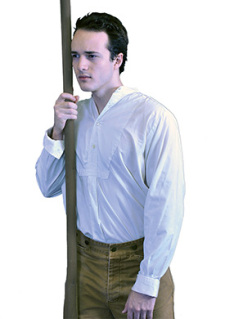
Senior Michael Clinkscales plays the title role in ISU Theatre's "The Night Thoreau Spent in Jail," playing the next two weekends in Fisher Theater. Photo by James Tener.
The play, written in 1969 during the Vietnam War, takes place over the course of a night in 1846 that writer and abolitionist Henry David Thoreau spent in jail. He refused to pay a poll tax because he doesn't want his money supporting what he considers his country's unjust war with Mexico. In jail, Henry talks with his cellmate, and in a series of flashbacks, the play tracks the events that led to Henry’s arrest. They include his education at Harvard, brief career as a teacher, his relationship with mentor (and later neighbor on Walden Pond) Ralph Waldo Emerson, and his act of civil disobedience.
Professor of theater and director Jane Cox said the play is less about an icon and more about a 28-year-old man searching for the best way to live his life.
"In so doing, he discovers that his idols may not be perfect, that love is not always returned, and that not everyone is going to approve," Cox said. "He also discovers that there is great joy to be had in hearing 'a different drummer' and following a unique path."
The production features senior Michael Clinkscales (psychology) as David Henry Thoreau, senior Keegon Jackson (performing arts) as Ralph Waldo Emerson and senior Emily Linch (English education) as Emerson's wife, Lydian.
Juniors Lindsay Koehler (journalism) and Rebel Clodi (performing arts) have the stage manager and costume designer responsibilities, respectively, for the production.
Cox said the production makes use of images -- locales both indoors and out -- projected around the stage to assist with the play's rapid scene shift.
Tickets are $18 ($16 for senior citizens, $11 for students) and can be purchased at all Ticketmaster locations, including the ticket office in Stephens Auditorium, or at the door.
